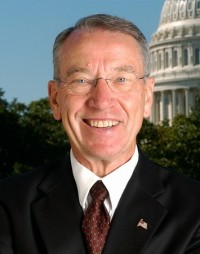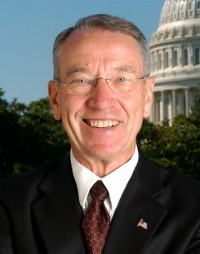Sen. Chuck Grassley has dodged and weaved when asked whether climate change is a human-caused problem that needs to be taken seriously, as David Roberts points out.
Grassley exhibited that same tendency in an email he sent recently to constituent (and Grist reader) Ben Thompson, who had asked the senator about his views on climate legislation. Grassley wrote that schemes to reduce greenhouse-gas emissions “are effectively a national energy tax,” and argued that Congress should focus instead on “increas[ing] the availability of renewable and alternative energy sources.”
Thank you for taking the time to email me. As your senator, it is important for me to hear from you.
I appreciate hearing your concerns regarding global climate change. I recognize that various predictions of global climate change have been a cause of concern for many and I believe that it is prudent to consider sensible steps to address potential future warming.
Nevertheless, it is important that the American people understand that such proposals to limit emissions of certain gases come with significant costs both to families and the economy as a whole. The consensus among economists is that any scheme designed to reduce greenhouse gases would result in costs passed on to all Americans and therefore these proposals are effectively a national energy tax. It is important to be honest about this point and to weigh any environmental benefit against the inevitable costs.
While I believe that it is prudent to consider sensible steps to address potential future warming, I have also always said that any environmental policy should be based on sound science, not political science. Virtually all scientists agree that the natural greenhouse effect contributes to warming, but we do not know the direct consequence natural variations in climate may have had on warming. Differences remain about how much our climate could change in the future, the pace of the possible change, or how human actions could impact it.
Concentrations of greenhouse gases, particularly carbon dioxide, have increased since the beginning of the industrial revolution. Although progress through technology to stabilize concentration of greenhouse gases has been made, there has not been a cost-effective method developed to capture carbon emissions at their source.
The House of Representatives has passed legislation that would create a cap and trade system to reduce the amount of carbon dioxide and other greenhouse gasses that are produced by various entities in our economy. In the Senate, a similar bill has been released and the relevant committees are considering this legislation. Because of the complexity of this issue and the many implications of this legislation for our economy and our society, I expect extensive debate in the Senate.
As a matter of fairness and in order to be more effective, I have repeatedly said that any effort to reduce greenhouse gasses should be addressed through an international agreement. In fact, EPA administrator Lisa Jackson has admitted in recent testimony that any unilateral action by the United States would provide no real environmental gain.
In the meantime, the most effective action Congress can take now to address potential future climate change, as well as make our air cleaner and healthier, is to redouble our efforts to increase the availability of renewable and alternative energy sources. In fact, I have been a leader in the Senate in promoting alternative energy sources as a way of protecting our environment and increasing our energy independence. Your comments will be helpful to me as the Senate considers any legislation related to global warming concerns.
Again, thank you for contacting me. I appreciate hearing your views and urge you to keep in touch.
Sincerely,
Chuck
Do you know what your own senators think about climate legislation? Ask them, then tell us what you find out.
Here’s more on Grassley and climate, as written by Kate Sheppard on Aug. 5, 2009:
Sen. Chuck Grassley seems to relish his role as a maverick among Republicans. He has not bucked his party on climate votes in the past — he voted against the Lieberman-Warner Climate Security Act last year. But his home state of Iowa could gain a good deal from a climate bill if Big Ag gets all it wants out of the legislation.
Grassley recently predicted that climate legislation will have trouble in the Senate, but he disagreed that it’s a dead prospect. “[W]hen you’ve got Democrats that are leading this Congress, and Gore pushing them in the religious way he’s pushing them, they’re going to want to produce something,” he said in an interview on CNBC. “But I’m telling you, if it had trouble getting 219 votes in the House, it’s going to have really big trouble getting 60 votes in the Senate … there’s some real trouble in the United States Senate on the global warming issue.”
Grassley has been outspoken in his belief that China, India, and other developing nations must curb their greenhouse-gas emissions, arguing recently on This Week with George Stephanopoulos, “If the United States moves ahead by itself [on cap-and-trade] … after 30 or 40 years, we’re going to reduce CO2 by less than 1 percent.” He made a similar statement on a call with reporters in July. “If the United States would go ahead — because we’re supposed to so-called set an example for the rest of the world — and if the rest of the world doesn’t go along, then we’re turning out to be suckers because we’re going to just reduce total CO2 by a spit in the ocean by ourselves,” he said.
 Track the debate and take action >>>
Track the debate and take action >>>
At a recent Senate Finance Committee hearing on climate policy and international competitiveness, he said, “I’ve said many times that we ought to approach this issue through a worldwide, international agreement. That’s the only way to ensure that China and India and other major carbon-emitting countries are involved. Otherwise, our industry is going to be left very uncompetitive. We’re going to see more manufacturing move overseas where less efficient plants produce far more pollution than our American industries, and nobody should want to do that.”
Grassley’s other concerns about a climate bill include how it would affect the agriculture sector and energy consumers in coal states like Iowa. As the ranking minority member of the Finance Committee, which is likely to craft a portion of the bill, Grassley may play an important role in shaping the legislation — even if he doesn’t ultimately vote for it.
Do you know more about this senator’s stance on climate legislation? Tell us.
Find out about other senators by clicking on their names in the right column.




